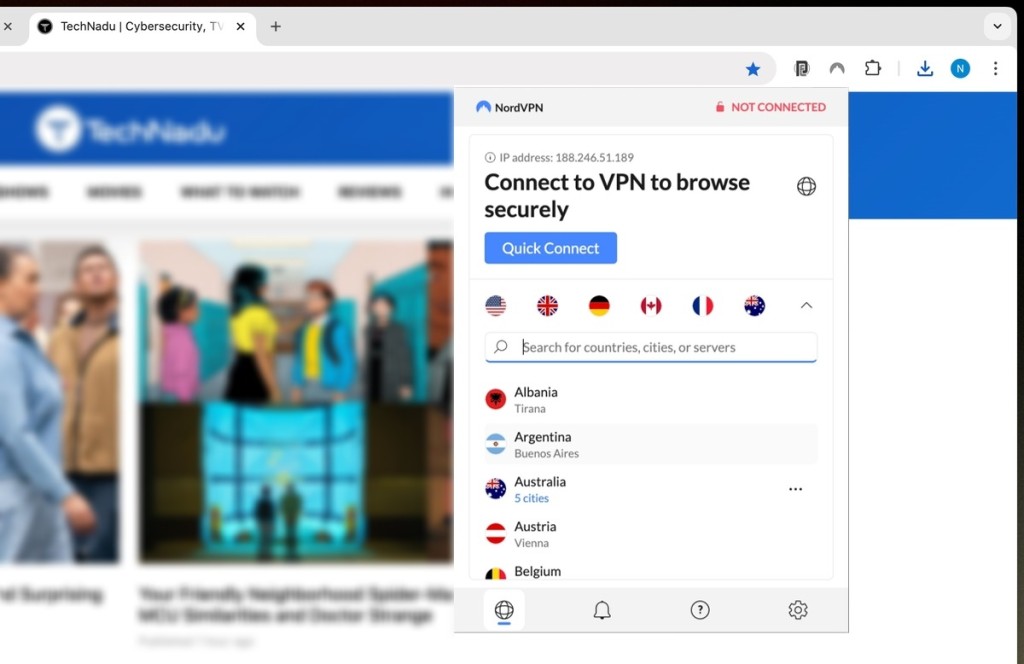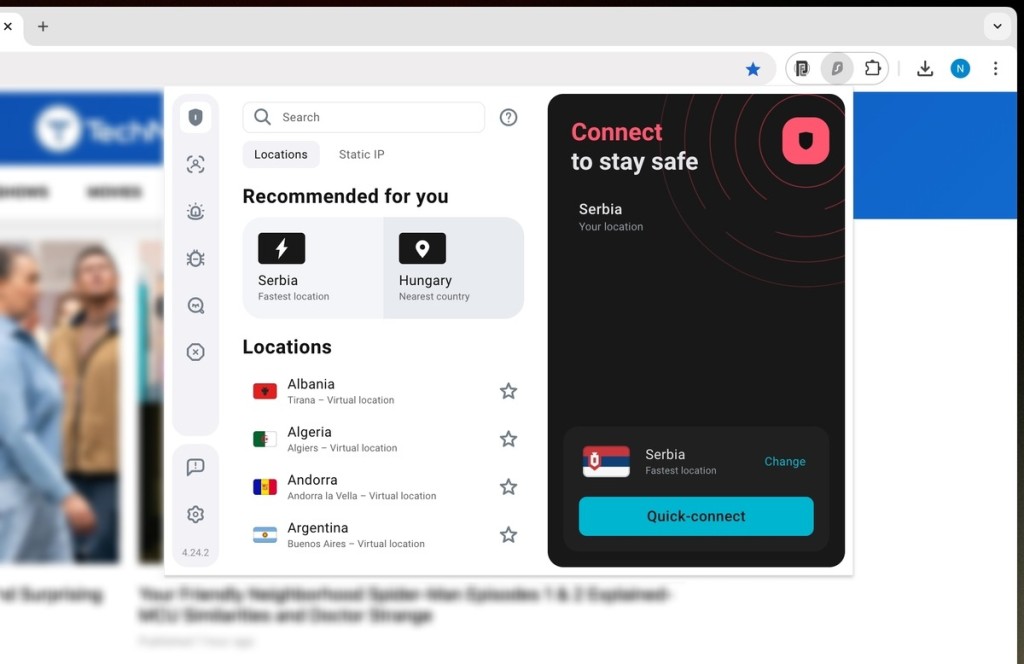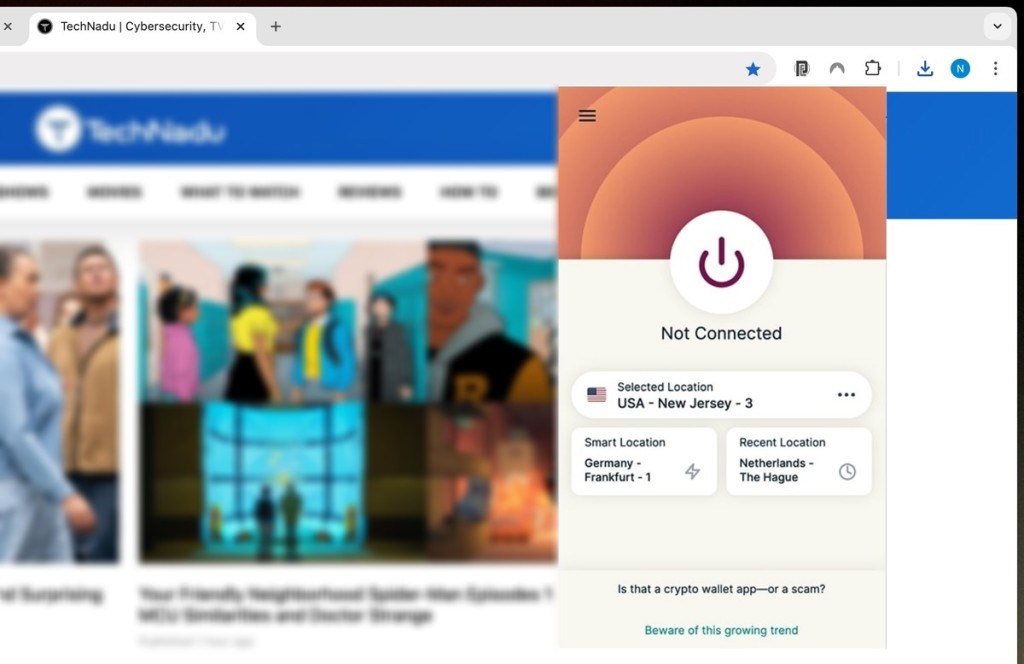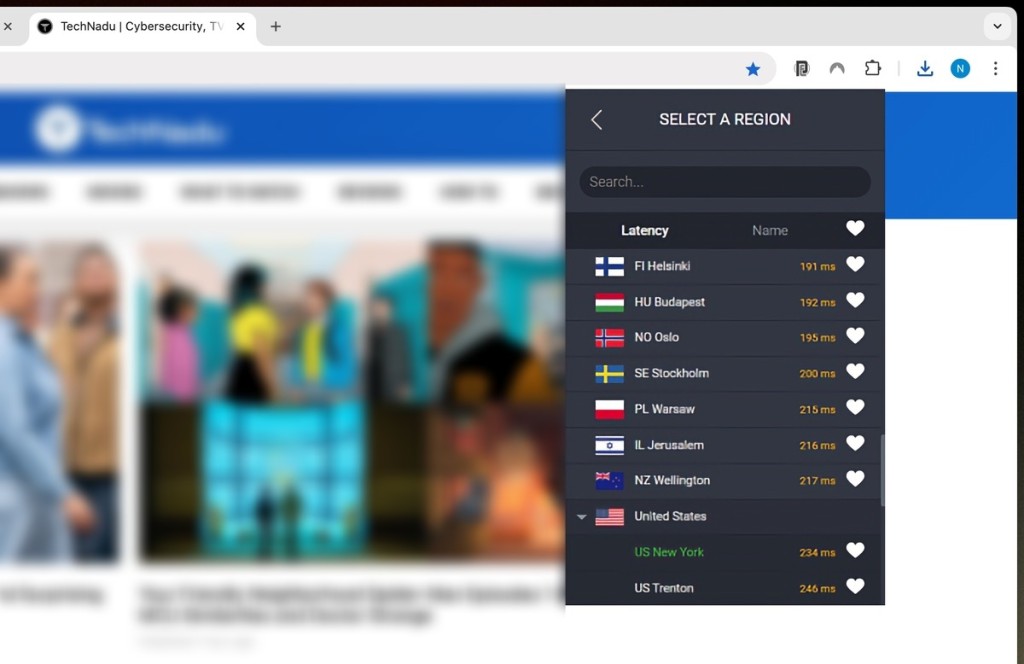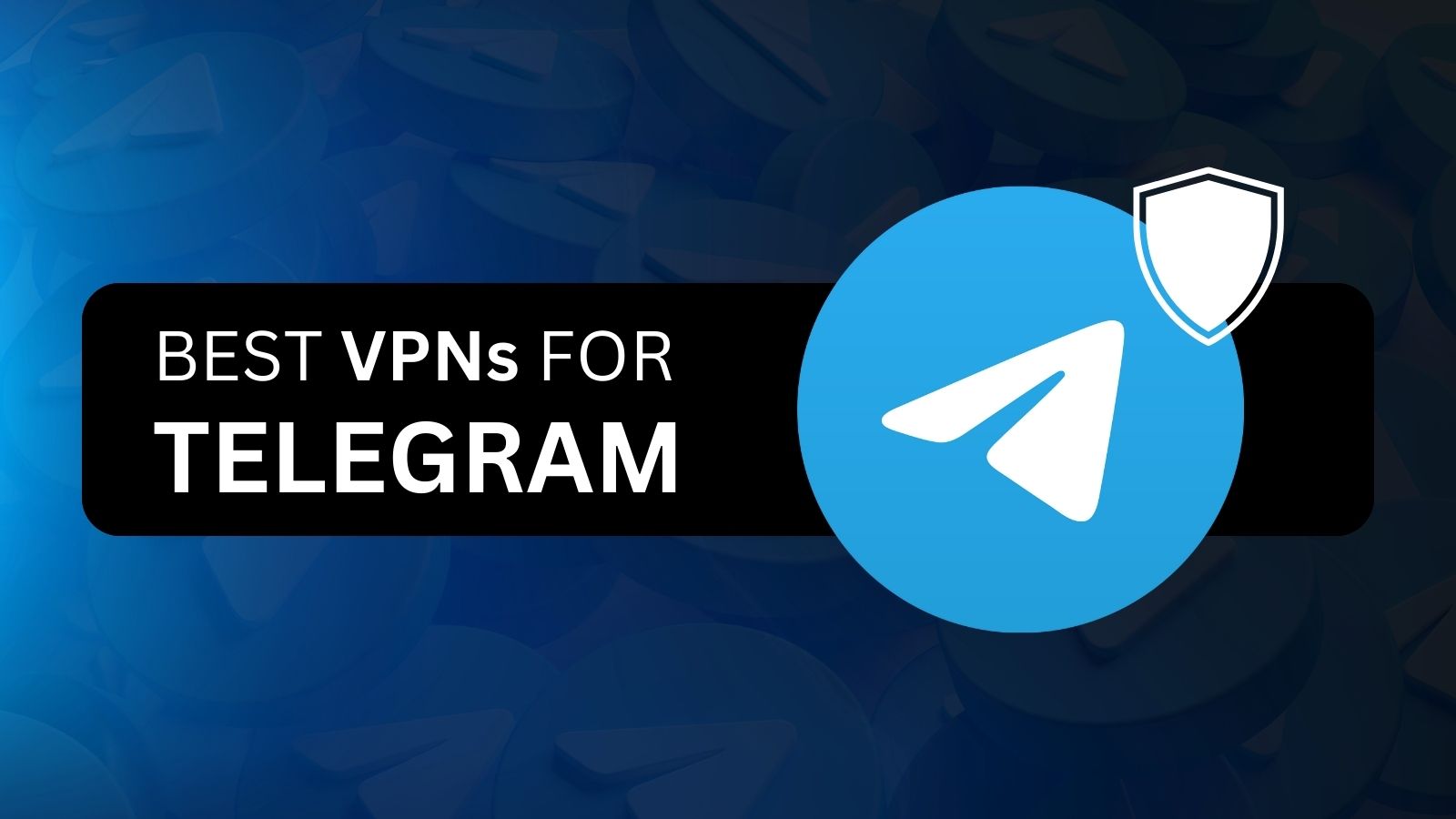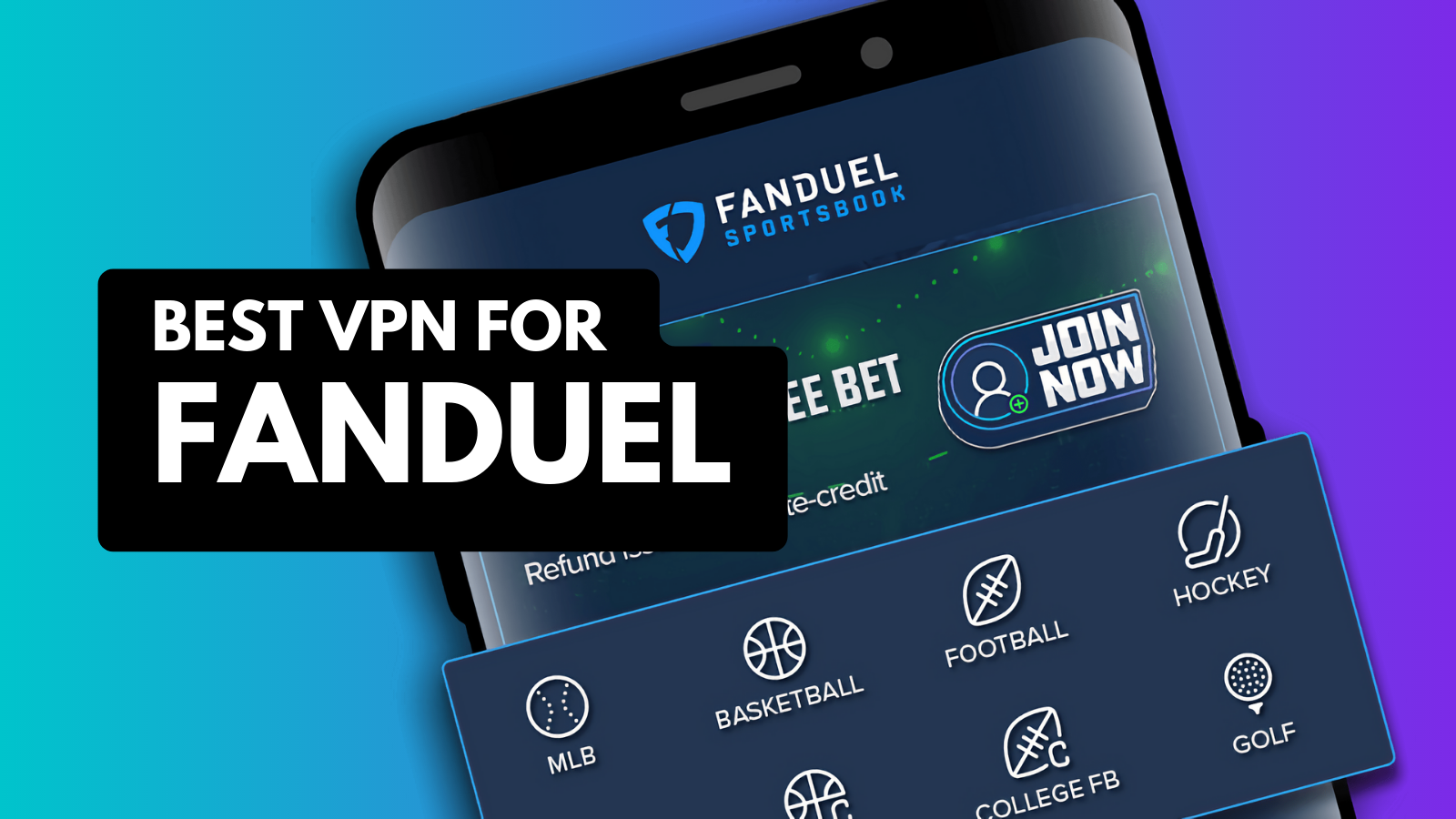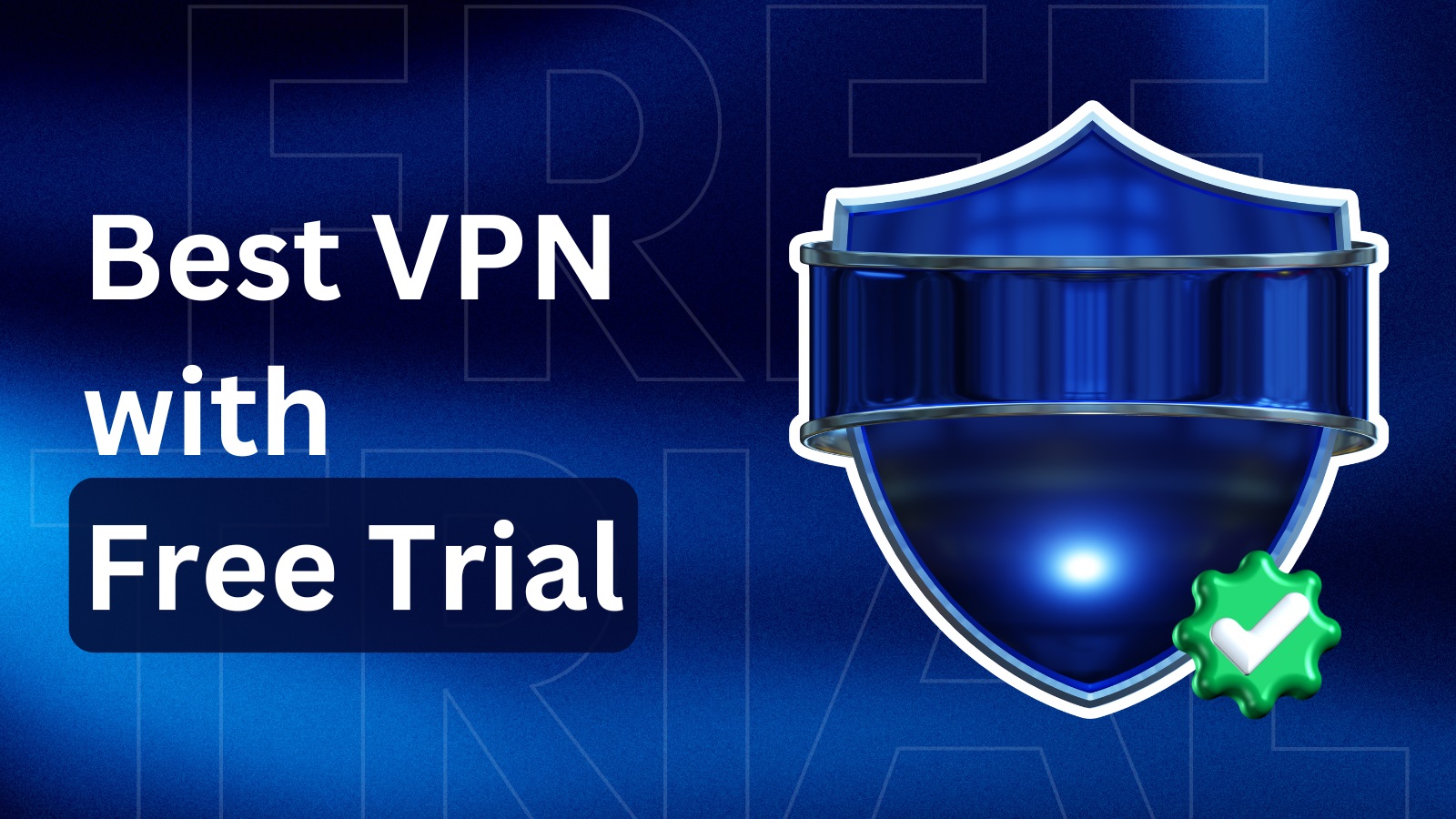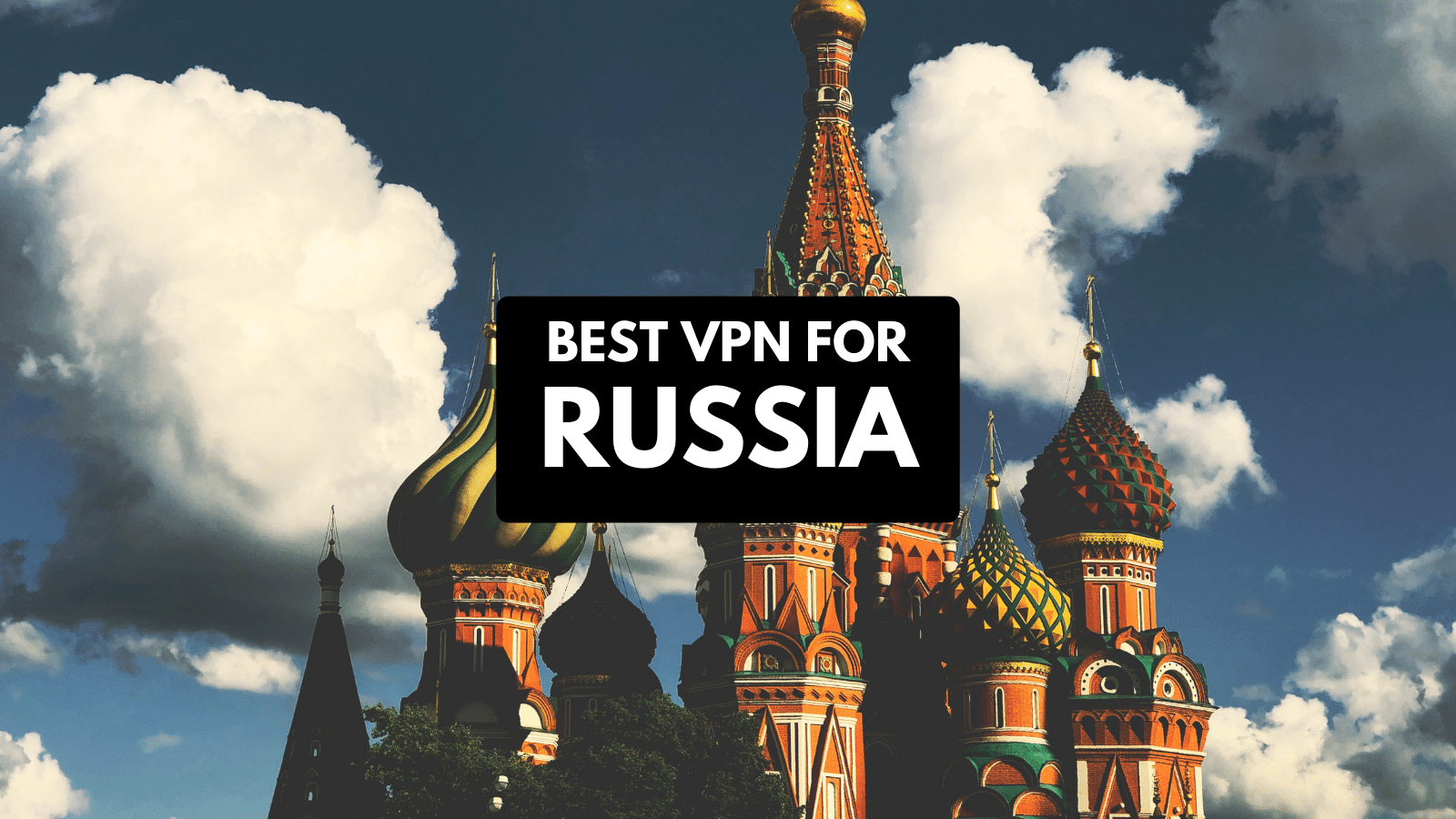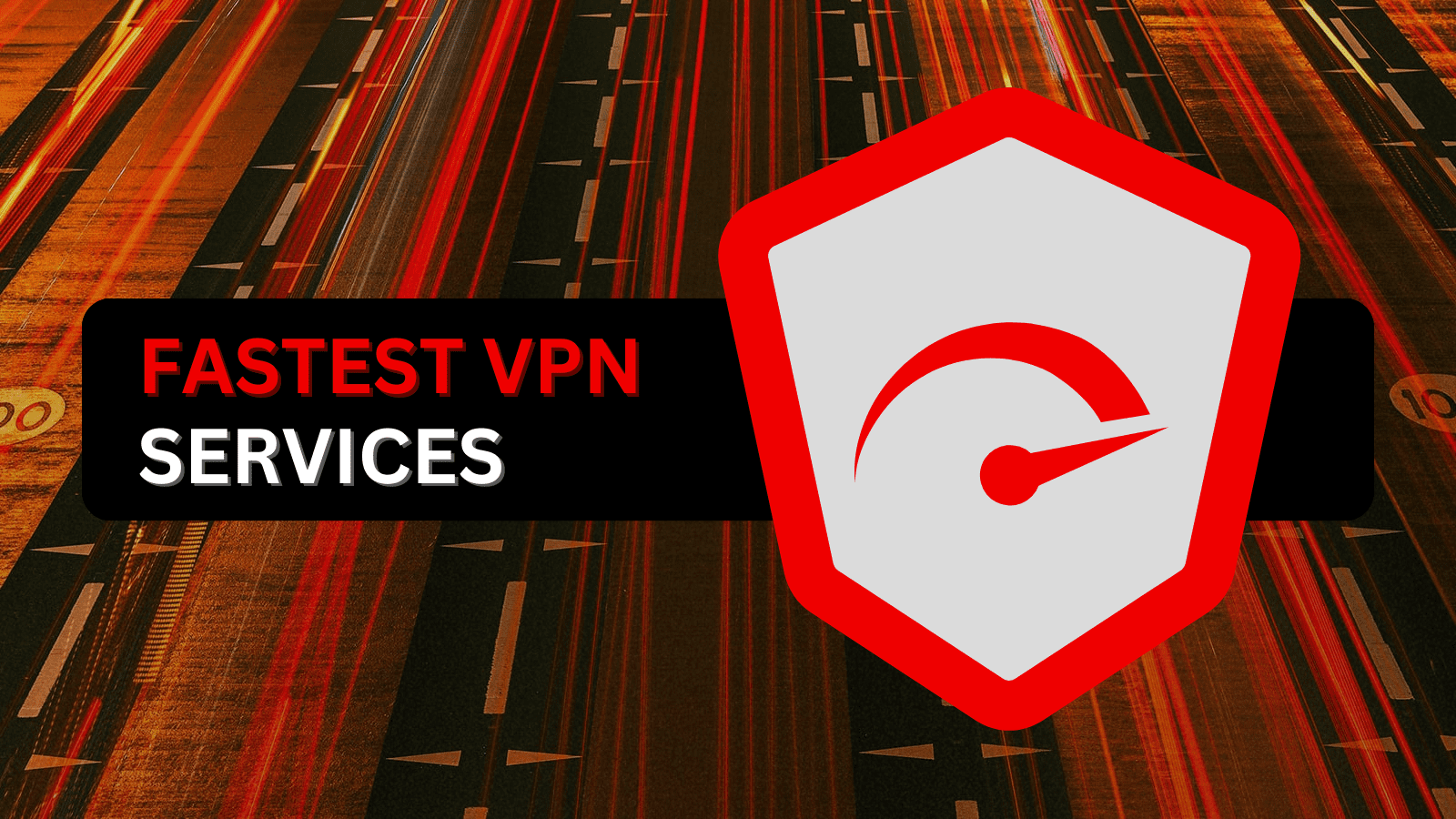When you purchase through links on our site, we may earn an affiliate commission. Here’s how it works.
4 Best VPN Browser Extensions in 2025
Our experts have reviewed 53 VPN providers, which were put through extensive rounds of testing. To learn more about that process, here’s how we review VPNs, where we explain our criteria and our policy of being fully transparent.
When interacting with the Web, you're limited by the browser you use. That said, perhaps you didn't know that Web browsers are prone to IP, DNS, and WebRTC leaks, allowing trackers to collect your geo-data and browsing history as well as follow you wherever you go on the Web.
Also, your browser can't do much to bypass geo-blocks, eliminate advertisements, or prevent malware from reaching your device. However, there's an easy way to improve your Web browsing experience and make it safer and more private.
Using a VPN browser extension, you can hide what you do online. The best ones will also help you bypass geo-blocks, prevent data leaks, and block ads.
In this guide, we'll talk about the best browser VPNs, explain why you need one and how to use it, explain the differences between VPN browser extensions and VPN native apps, what to look for in one, answer some related FAQs, and plenty more.
How to Use a Browser VPN Extension
First, you need to subscribe to a VPN, access its extension using your browser's add-on store, and install it from there. Then, you can start connecting to servers. Use the following steps:
- Subscribe to a VPN that has a capable browser extension (we recommend NordVPN).
- Visit your browser's Add-Ons Store and download the extension.
- Launch the extension to activate it.
- Provide your credentials to log in.
- Connect to a suitable VPN server. That’s it!
Remember that a VPN browser extension (add-on) encrypts and protects everything you do within your Web browser. However, your VPN will also offer a native application, which can be suitable for unblocking apps, gaming, and even torrenting. It's best to use both for complete privacy protection.
The Best VPN Browser Extensions in 2025
You first need to focus on the Web browser you use. In other words, find a VPN extension with native support for your Web browser. Then, you'll want to have access to a sizable server network covering as many locations as possible.
Don't forget about privacy and security. You'll want a VPN that follows a no-logs policy and is powered by strong enough protocols and encryption. As mentioned above, it must also protect you against all manner of data leaks, including IP/DNS/WebRTC leaks.
You can also expect a VPN extension to assist you in bypassing geo-blocks. That means you'll want fast and stable performance, especially if you're into media streaming. Also, there should be enough simultaneous connections to help you protect your data on the go as well.
Finally, let's not forget that you'll want a fair price and plenty of value, as well as money-back guarantees, which must be generous enough to give you plenty of time to test-drive your chosen VPN. However, pay attention to customer support as well and aim for 24/7 live chat support.
In our search, we tested more than 50 providers hands-on. Based on those findings, these are the 4 best VPNs for a browser in 2025:
1. NordVPN – Our #1-Rated Best VPN Browser Extension in 2025
NordVPN is perhaps the most capable VPN provider available today, allowing you to protect your privacy and unblock the Web. It's very easy to use, and you can set it up in minutes. Also, you'll find NordVPN's extensions for Chrome, Firefox, and Edge.
NordVPN has a wide server network that consists of 7,400+ servers in 118 countries. It also has excellent privacy as it uses the Transport Layer Security (TLS) protocol for data protection. Next, there's military-grade encryption, split tunneling, and a no-logs policy, and it blocks ads and malicious websites with the 'Threat Protection Lite' feature.
This Panama-based VPN prevents your IP address from leaking by blocking WebRTC. It also creates very strong data tunnels with no chance of a DNS/IP leak. On top of that, NordVPN unblocks popular streaming platforms like Netflix, Hulu, BBC iPlayer, and Disney+ while allowing you to stream in 4K.
We can also praise this VPN's performance, as NordVPN is among the fastest VPN providers right now. No matter if you connect to nearby or remote servers, you won't notice any drops in your connection's speed and overall performance. We'll also note that NordVPN supports 10 simultaneous connections.
Everything mentioned above is available at $3.09 per month for 24 months. It also offers a 30-day money-back guarantee and 24/7 customer support, which you can access via the live chat feature on its website.
Head over to our NordVPN review if you wish to learn more.
PROS
- Sizable server network.
- Compatible with many browsers.
- Blocks ads and trackers.
- Standalone VPN extension.
- 24/7 customer support.
- 30-day money-back guarantee.
CONS
- Pricey month-to-month plans.
2. Surfshark – Best Browser VPN Extension for First-Time Users
Surfshark is an easy-to-use provider from the Netherlands with modern extensions for Chrome and Firefox. You can use the Chrome extension on Brave, Opera, Edge, and other Chromium-based browsers, and the Firefox extension works with Gecko-based browsers.
With Surfshark, you can choose from more than 3,200+ servers in 100 countries. Furthermore, you get military-grade encryption, split tunneling, and a strict and audited no-logs policy. The provider’s extension blocks ads, pop-ups, and WebRTC leaks, and also offers data breach and malware alert tools.
Additionally, Surfshark Search performs Web searches in complete privacy with no ads, no logs, and no trackers, displaying purely organic results. However, that add-on comes priced extra (it's priced at only a couple of dollars per month).
You'll have access to all the popular streaming platforms and won't have any problems streaming in 4K because Surfshark's super-fast connections won't let you down. Another great thing about Surfshark is that it supports unlimited simultaneous connections, so you can use it with your Web browser as well as on the go.
To become a subscriber, you'll need to pay $1.99 per month for , which you can use as a risk-free trial. On top of that, its website has 24/7 customer support via live chat, in addition to plenty of other support resources.
If you need more information, don't forget to read our Surfshark review.
PROS
- Works with Chrome, Firefox, and more.
- Beginner-friendly extension.
- Excellent security.
- Blocks WebRTC and ads.
- 30-day money-back policy.
- 24/7 customer support.
CONS
- Can take a few moments to connect.
3. ExpressVPN – Native VPN Protection for High-End Data Privacy
ExpressVPN is a high-end VPN that offers a fully-featured experience on Chrome, Firefox, Edge, Brave, Vivaldi, and more. It’s important to note that ExpressVPN doesn’t have a standalone extension, and it's not available for Safari - you have to download the app on your device so the two can work together to provide better encryption.
This VPN has an undisclosed number of servers in 105 countries. It also includes advanced security features such as AES-256 and ChaCha20/Poly1305 encryption, and it blocks WebRTC, so sites can't detect your real location and IP address. The provider also has a strict no-logs policy, and unlike most other extensions, this one uses protocols like OpenVPN, Lightway, and IKEv2.
According to our tests, this British Virgin Islands-based VPN is among the fastest, making it ideal for streaming, torrenting, and playing browser-based games. It unblocks any streaming platform, including Netflix, Hulu, Disney+, iPlayer, and more. It also works excellent for bypassing censored websites, as it offers obfuscation.
Thanks to its lightning-fast Internet connection speeds, you can stream all these services in 4K with no buffering. Let's not forget that ExpressVPN supports 8 simultaneous connections, which seems quite generous.
You can start using ExpressVPN at $4.99 per month for 24 months. The provider also has a 30-day money-back guarantee, and if you don't like its services, you can request a refund via its 24/7 live chat feature.
To see this VPN in action, visit our in-depth ExpressVPN review.
PROS
- Works on all Web browsers.
- High-end data encryption.
- Unblocks any site.
- Audited no-logs policy.
- 24/7 customer support.
- 30-day money-back policy.
CONS
- Not a standalone extension.
- On the pricier side.
4. PIA – Great for Blocking Trackers and Online Advertisements
PIA (Private Internet Access) provides extensions for Chrome, Firefox, Edge, and Opera. It's known for its high-end data privacy features and a high level of customization. As such, it's a perfect option for more advanced users.
This US-based VPN has an extensive network with an undisclosed number of servers in 91 countries. It's known for its presence in the US, especially - as it has servers in all 50 US states. Additionally, PIA provides military-grade encryption, strong protocols, and doesn't collect any activity or connection logs. It also blocks ads, disables trackers, and protects your microphone and webcam from unauthorized access.
You'll also get features like WebRTC blocking, sorting gateways by latency, URL whitelisting, and an easy ON/OFF switch. That said, this VPN allows you to customize plenty about your data tunnel, so we recommend it to advanced users.
PIA works well for bypassing geo-blocks, as well. If you wish to access censored or geo-blocked sites, including media streaming services, PIA will get the job done. Also, this VPN switched to unmetered connections recently and now supports unlimited simultaneous connections.
In terms of its price, expect to pay $2.03 per month for 24 months. You can try out PIA's services risk-free thanks to its 30-day money-back guarantee, and if you have any questions, you can ask for help via its 24/7 live chat.
Our Private Internet Access review provides a deeper look at this provider's features.
PROS
- Works with many browsers.
- Extra-big server network.
- Excellent security.
- Plenty of fine-tuning.
- 30-day money-back policy.
- 24/7 live chat support.
CONS
- Might be overly technical for some.
- Medium-fast connection speeds.
Comparing the Best Browser VPNs
How We Rank the Best Browser VPN Extensions?
We have focused on the top-rated VPNs as reviewed by our team, which our team tested hands-on. In preparation for this guide, we focused on checking each VPN's compatibility with browsers like Chrome, Firefox, Edge, Safari, and more. Most VPN browser extensions serve as proxies, so we focused on finding those that offer a complete set of VPN features.
We prioritized VPNs that offer strong protocols and high-end encryption. Our recommendations also all have vast server networks. Plus, our testing process also included connecting to nearby and remote servers, which is how we checked each VPN's performance, data leak protections, and content-unblocking features.
Why Do You Need a VPN Extension for Browsers?
You need a VPN to protect your privacy, unblock websites, and make sure no one tracks you online. Find more information just below.
- Access Global Content - To access websites not available in your country, you need another country's IP address. That's exactly what a VPN gives you, plus the ability to unblock streaming platforms and plenty more.
- Avoid Local Censorship - If your country imposes website blocks, you won't be able to bypass them, no matter which browser you use. Still, that changes as soon as you create a VPN session, which allows you to bypass censorship and anti-VPN blocks.
- Browse Home Sites While Traveling - If you want to use the same websites you used back home, go for a VPN while traveling. Just launch your VPN extension, pick your country, and you'll get to unblock your home websites.
- Prevent Data Leaks - Aside from IP and DNS leaks, today's browsers are prone to WebRTC leaks, which allow trackers to follow you on the Web. But once you start using a VPN, you'll plug those vulnerabilities and stop trackers from following you.
- Avoiding Bandwidth Throttling – Chances are that your ISP (Internet Service Provider) will slow down your connection if it sees that you're using a lot of data. You can prevent this with a VPN because it stops your ISP from seeing what you do online.
- Eliminate Online Ads - Most of today's VPNs use special DNS routing to remove ads, which means that they act as ad-blockers. This can speed up your Web browser, as well as keep you more private online as some ads can be malicious.
- Shop Safely Online - It's true that e-commerce websites typically use encryption to hide your payment information. However, don't trust third-party websites to handle your privacy with care when a VPN can do the same in a much better way.
- Avoid Price Discrimination - It's no secret that online stores determine their prices based on your location. In other words, a VPN can make you appear somewhere else where the prices are cheaper in general.
- Hiding Your Browsing Activity – Browsers track your online history. To hide what you do online, including what you search for, you'll need a VPN to encrypt your Internet connection and shield your activity.
- Hide Your IP Address - Your browser uses your IP address to pinpoint your location, which is an obvious privacy intrusion. However, a VPN hides your IP by replacing it with one associated with the location of your chosen server.
- Connect Safely to Public Wi-Fi – Public Wi-Fi networks are easy to hack and might retain your information. To avoid this, you can use a VPN and secure your connection to ensure no one gets access to your data.
How to Choose the Best Browser VPN Extension?
To choose the best option available, take a good look at its set of features. You'll want one compatible with your browser of choice, offering strong privacy, plenty of servers, and the ability to unblock the Web. Here's what to keep in mind.
- Full Support for Web Browsers - You need to pick a VPN based on the Web browser(s) you use. You'll have an easy time finding a VPN for Chrome and Firefox, but you need to pay more attention if you use a more "exotic" Web browser, such as Tor Browser.
- Plenty of Servers Worldwide - You'll want a VPN with as many servers as you can find in as many countries as possible. That will give you the ability to bypass more geo-blocks and change your Chrome location, and you can do the same in Firefox, Edge, Safari, and more.
- High-End Privacy & Security - Go for a VPN that offers high-end encryption, such as AES-256. You'll also want strong protocols and some form of obfuscation. Also, keep in mind that most VPNs that come as browser add-ons are just proxies, which you'll want to avoid.
- Protection Against Leaks - Most extensions are made to protect you from IP, DNS, and WebRTC leaks, as well as browser fingerprinting, which means they work by closing your browser's vulnerabilities and ensuring malicious actors stay away from your data.
- Ability to Bypass Access Restrictions- There's little you can do in your browser to bypass geo-blocks. The only reliable way to do so is by changing your IP address, and that's what a VPN can do. So, ensure to get a VPN with a large pool of IPs.
- Fast Speed & Stable Performance - Many VPNs are extra-fast, but that's because they use low-end encryption. Your goal should be to use encryption like AES-256 to protect your data, but without imposing limiting speed caps.
- Plenty of Simultaneous Connections - If you have multiple devices, ensure to get a VPN that allows you to use its extensions simultaneously on all your computers. Also, your VPN should offer apps that help you stay protected even on the go.
- Wallet-Friendly Pricing Plans - As you can see by now, your VPN should meet a hefty set of requirements. That said, your chosen VPN doesn't have to cost a lot. Pick a VPN that brings plenty of value overall, and know that you can lower your VPN cost with long-term plans.
- Generous Money-Back Guarantees - If you're after a risk-free purchase, get a VPN that offers a generous money-back policy. Most reputable VPNs will give you from 30 to 45 days to change your mind and ask for a refund with no questions asked.
- Helpful Customer Support - As recommended above, you should get a VPN with 24/7 live chat support. That way, you can count on a speedy solution if something goes wrong without having to pause your online activities.
VPN Extensions vs. Native VPN Apps: Which Is Better?
When comparing VPN extensions and native VPN apps, we can conclude that native VPN apps are the better choice overall. However, it can depend on what you need to use a VPN for.
VPN extensions are great for those who only want to protect and secure activity in their browser alone. That's because VPN extensions that work with Chrome, Firefox, and Tor, for example, are installed directly on your browser and only cover your browser traffic. Everything else outside your browser will be left unprotected.
A native VPN app, on the other hand, protects all your data on any devices it's installed on. Whether you use it to play a game or watch a streaming service like Netflix, your data and traffic will always be protected. Better yet, if you set up your VPN on a router, all the devices connected to that Wi-Fi network will automatically be secured.
Can You Use a Free VPN Extension for Browser?
Yes, you can use a free VPN for your browser. However, doing so is not recommended because they have weak privacy and security protocols.
As you can imagine, free VPNs need continuous revenue streams. Since they won't get any revenue from their extensions, they need to make money elsewhere. Unfortunately, many of them opt to sell your data to do so.
Some can also distribute malware to collect your data. Then, they sell that data to the highest bidder - an advertising agency in most cases. Aside from that, free VPNs come with limited server fleets, limited bandwidth, and restricted performance.
Our strong and honest recommendation is to go for a premium VPN. You can use any of the options found above, or you can consult our guide to the most popular VPNs. Even better, you can go for a VPN free trial, which is a risk-free way to get premium VPN features for a limited time.
For example, we recommend NordVPN's free trial, which can be activated on Android and used for 7 days. For other platforms, NordVPN has a 30-day money-back policy.
Final Thoughts
Some Web browsers are more private than others - but none are immune to online tracking. Luckily, we have VPNs that can plug security vulnerabilities, prevent leaks, and preserve your privacy. Furthermore, today's VPNs can also block ads, prevent you from visiting malicious sites, and they can also bypass geo-blocks.
As you can see, there's plenty to expect from a capable provider. That said, there is no better option than NordVPN, whose easy-to-use extensions deliver everything listed above. NordVPN is also the best VPN browser extension since it's the fastest, has an army of servers, and enhances your digital privacy like no other provider.
That said, other excellent options exist as well. Surfshark provides a highly streamlined and beginner-friendly VPN extension, while ExpressVPN has managed to offer perhaps the highest level of security. Let's not forget about PIA either, which can unblock any website with minimal throttling.
That's all that we have prepared for this guide. If you have any comments or remarks, share them via the comments section below. Thanks for reading!

